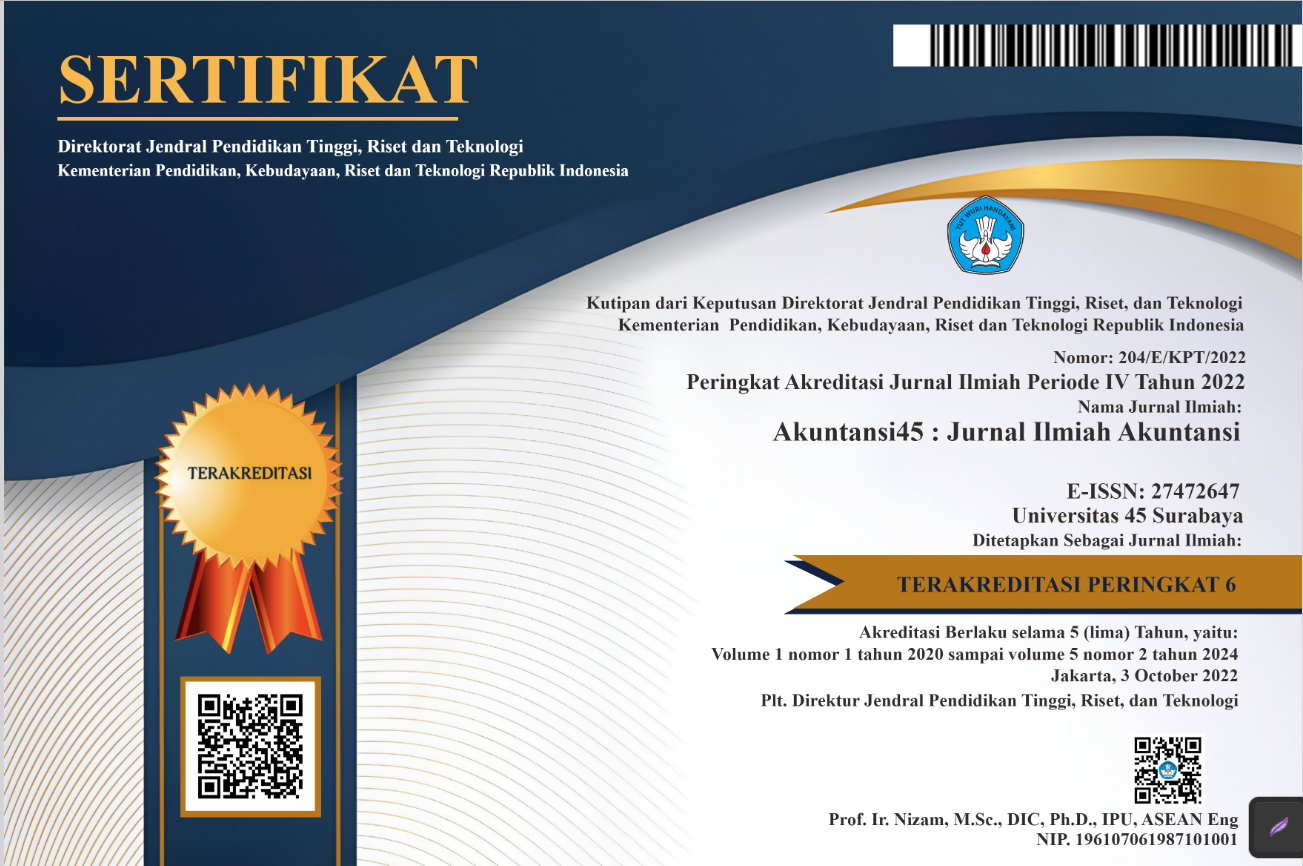Korelasi Antara Zero Based Budgeting Dengan Efisiensi Operasional Pada Perusahaan Jasa Kontraktor
DOI:
https://doi.org/10.30640/akuntansi45.v6i1.4188Abstract
This study aims to examine the correlation between the implementation of Zero-Based Budgeting (ZBB) and operational efficiency in contractor service companies. A quantitative method was used with a case study approach at CV. KMP. Data were collected through questionnaires using a Likert scale (1–4) involving 15 respondents, including project managers, budget staff, and field supervisors. The data analysis showed a Pearson correlation coefficient of 0.973 and a significance value of 0.000, indicating a positive and significant relationship between ZBB and operational efficiency. The application of ZBB has proven effective in reducing cost waste and enhancing project execution efficiency. This research contributes to the development of performance-based budgeting strategies to improve operational efficiency in contractor companies.
References
Antoro, H. R., & Wibowo, M. S. (2022). Evaluation of Budgeting Process for Infrastructure Investment Project in Manufacturing Companies (Case Study on PT. XXX). Proceedings of the International Conference on Economics, Management and Accounting (ICEMAC 2021).
Coyte, R., Messner, M., & Zhou, S. (2022). The Revival of Zero-Based Budgeting: Drivers and Consequences of Firm-Level Adoptions. Accounting and Finance, 62(3), 3147–3188. https://doi.org/10.1111/acfi.12884
Horngren, C. T., Datar, S. M., Rajan, M. V, Columbus, B., New, I., San, Y., Upper, F., River, S., Cape, A., Dubai, T., Madrid, L., Munich, M., Montréal, P., Delhi, T., São, M. C., Sydney, P., Kong, H., Singapore, S., & Tokyo, T. (2012). Cost Accounting A Managerial Emphasis Global Edition Fourteenth Edition. www.pearsoned.co.uk
Jensen, M. C., & Meckling, W. H. (1976). Theory of the Firm: Managerial Behavior, Agency Costs and Ownership Structure. In Journal of Financial Economics (Issue 4). Harvard University Press. http://hupress.harvard.edu/catalog/JENTHF.html
Kausar, A., Lim, J.-H., & Park, Y. (2025). Data Analytics and Operational Efficiency. Accounting Horizons.
Kazar, G., Mutlu, U., & Tokdemir, O. B. (2022). Development of Zero-Based Budgeting Approach for Multinational Construction Contractors. Engineering, Construction and Architectural Management Journal.
Kolwezi. (2023). Application of Zero Based Budgeting. Accounting and Corporate Management, 5(10). https://doi.org/10.23977/acccm.2023.051001
PP RI No 71. (2010). Peraturan Pemerintah Republik Indonesia Nomor 71 Tahun 2010.
Pyhrr, P. A. (1977). Zero-Base Budgeting: A Practical Management Tool for Evaluating Expenses (Wiley Series on Systems & Controls for Financial Management). John Wiley & Sons Inc.
Sabilli, H. I., & Candradewini. (2025). Penganggaran Pendapatan Usaha di PT X (Persero). Jurnal Administrasi Negara), Februari, 16(2), 142–151.
UU RI No 40. (2007). Undang-Undang Republik Indonesia Nomor 40 Tahun 2007 tentang Perseroan Terbatas.
Wetherbe, J. C., & Dickson, G. W. (n.d.). Zero-Based Budgeting: An Alternative to Chargeout Systems.
Downloads
Published
How to Cite
Issue
Section
License
Copyright (c) 2025 AKUNTANSI 45

This work is licensed under a Creative Commons Attribution-ShareAlike 4.0 International License.









